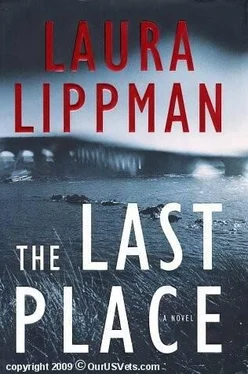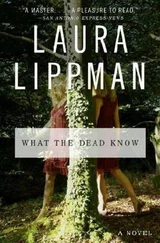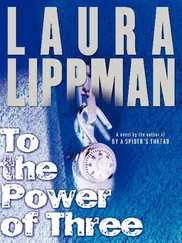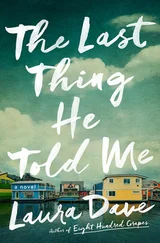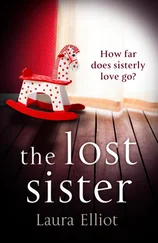Whitney ticked them off on her fingers. “Someone from Safehouse, of course. My family’s foundation. Baltimore’s Kids and New Solutions. The William Tree Foundation-”
Tess stopped her. “The William Tree Foundation? The one run by Luisa J. O’Neal?”
“Nominally. She’s not active anymore. Her health deteriorated after her husband left her.”
“Good,” Tess said, biting into her chopped beef sandwich so hard that it sent a little shot of pain through an upper molar. Her dentist said she ground her teeth at night, but she couldn’t bring herself to be fitted for a mouth guard.
“I know you hate her,” Whitney said, her eyes steady on Tess’s face, “but you’ve never told me why.”
“Hate her? How could I hate Luisa O’Neal, Baltimore’s benefactor, planter of trees, creator of parks, builder of grand public spaces. Like everyone else in town, I owe her everything-including my career.”
“I’d forgotten. Your first case, as it were. That lawyer who got killed worked for Seamon O’Neal. But the O’Neals didn’t have anything to do with his death.”
“No, they didn’t.” Another death, yes, but not his. “Whatever happened to Seamon? I haven’t seen the O’Neals in the society pages for a while.”
And she looked for them, Tess realized. Every Sunday.
“He ran off to North Carolina with a paralegal. Died of a heart attack six weeks later.”
“On top of her?”
“No, that would have been tacky. On the golf course. It was probably the nicest thing he ever did for Luisa. Stopped all the messy wrangling about money, which was only fair, as the money was hers anyway. Still, it took something out of her. She had a stroke, ended up in Roland Park Place. My mom went to see her recently-they used to play in the same tennis foursome.”
“I remember.” That relationship had kept Tess from telling Whitney about the things Luisa had done. “She’s not active, you said. So she won’t be there when I meet with the board?”
“No, she’s not involved at all. Just her money. I doubt if she even knows what the Tree Foundation does. From what my mother said, she’s lying in bed, waiting to die and refusing to talk to anyone. She wants to be with Seamon.”
“She wants to be with the man who routinely humiliated her throughout their marriage, spending her family’s money on a never-ending parade of paralegal tarts?”
“He dated a few associates, don’t forget. Anyway, she loved him. Why do you think she put up with him?”
“I don’t know. Perhaps your consortium should put some money toward solving that age-old problem. Why do people stay with people who treat them that way?”
“Why do women stay with men, you mean.”
“Men stay with women, too, when they shouldn’t. As Judge Halsey would be the first to remind you, the violence between men and women is a current flowing in both directions.”
Lunch finished, they stepped out in the bright day, eyes blinking after the dimness of the Corner Stable. In the instant it took for her eyes to adjust, an image came to Tess, an image she thought she had buried long ago.
She saw a man in flight, his body hurled through the sky, the malevolent shape of an old Marathon cab disappearing into the thick morning fog. It was her nightmare, the bad dream that disrupted her sleep every now and then. Was it her hour with Dr. Armistead that had dredged it up or the talk of Luisa O’Neal?
“Whitney-about my fee. How much does each group kick in? Do you divide it evenly among yourselves or is it prorated according to how much capital each group has?”
“Prorated,” Whitney said. “My family’s foundation will pay a third. It’s not based on means but on each organization’s commitment to domestic violence. Baltimore’s Kids is kicking in only a tiny amount, for example, because it’s not really what they’re about.”
“The William Tree Foundation, in particular. What percentage of my fee will they pay?”
“No more than ten percent. They’re more about building stuff than doing stuff. If they can’t put a plaque on it, proclaiming their philanthropy, they’re not much interested. I’m surprised they want to be part of this at all.”
Ten percent. Tess figured she could live with that. She would tithe that amount to some good cause, a belated apology to the man in the sky, whose death was still officially an unsolved hit-and-run. She needed to mark his memory in some way, to remind people that he had existed. She couldn’t afford to erect a plaque, but she could do something. She could do this.
After all, with Seamon O’Neal dead, and Luisa O’Neal on her way, a day would soon come when only Tess knew how her old boyfriend Jonathan Ross had come to be murdered while she watched.
He has another job, this one all the way down toward Virginia Beach. Most people would take 95, but, as much as he drives, he is never comfortable on the interstates. He crosses the Bay Bridge, takes 13 South. It’s about as close to home as he ever gets these days.
When people ask what he does, he says different things, depending on his mood. “Biomedical waste disposal,” for example. Or “Sales. Marine accessories.” His answers are designed and delivered to assure no follow-up. Still, he’s sometimes disappointed by his success. People are so incurious. They don’t really look, don’t really hear. People on the mainland think of everything as infinite-food, water, fuel. Other people.
The island had fewer than two hundred residents, which made it the smallest of all the inhabited islands in the bay: smaller than Smith, smaller than Tangier. His parents had gone to grade school there, but by the time he came along, the one-room schoolhouse only went to sixth grade. The older kids had been ferried back and forth to school by boat. By high school, most of his friends went to stay with relatives on the mainland, but he didn’t have any people off the island. The students on the mainland were nice enough, but they couldn’t be friends, not really. Not when you had to catch that boat every afternoon. No friends, no after-school activities. He had wanted to go out for a team. “Are we all supposed to wait for you, then?” the skipper had asked. He thought the others might be able to go to the library, read, and do their homework. But the little ones needed supervision and the big ones didn’t want to wait.
This is my whole world, he would say to himself, sitting on the boat as it made its way across the bay. I will never know anyone else. If I marry, she is on this boat right now. It scared him, to think he had such a small group of people from which to find his true love. The island had five surnames, give or take. It would be like marrying family, he supposed, but that’s what royalty did. He thought of the poem he was always having to memorize, each and every teacher thinking it was so clever, having the island boy learn the poem in which island was a metaphor. If a clod be washed away by the sea/Europe is the less. His first year in the mainland school, someone had laughed when he had recited those lines. He couldn’t know for sure, but it was a mean laugh, cutting. They were laughing because he was a clod, because they wouldn’t miss him if he were washed away, not one bit.
Then, in junior high, a new girl showed up. He knew, the minute he saw her, he knew. It was as every song, every poem, every story had prophesied: She was the one. Better yet, she knew. She liked him until she loved him. She loved him until-no, she loved him still. She had never stopped loving him, even if she had left him. He believed that with all his heart. From seventh grade on, there was no one in his world but her. He was never unhappy or impatient if she was there. Separated from her-she took French while he took Spanish, went to the mainland for singing lessons on the weekends-he was miserable.
Читать дальше
